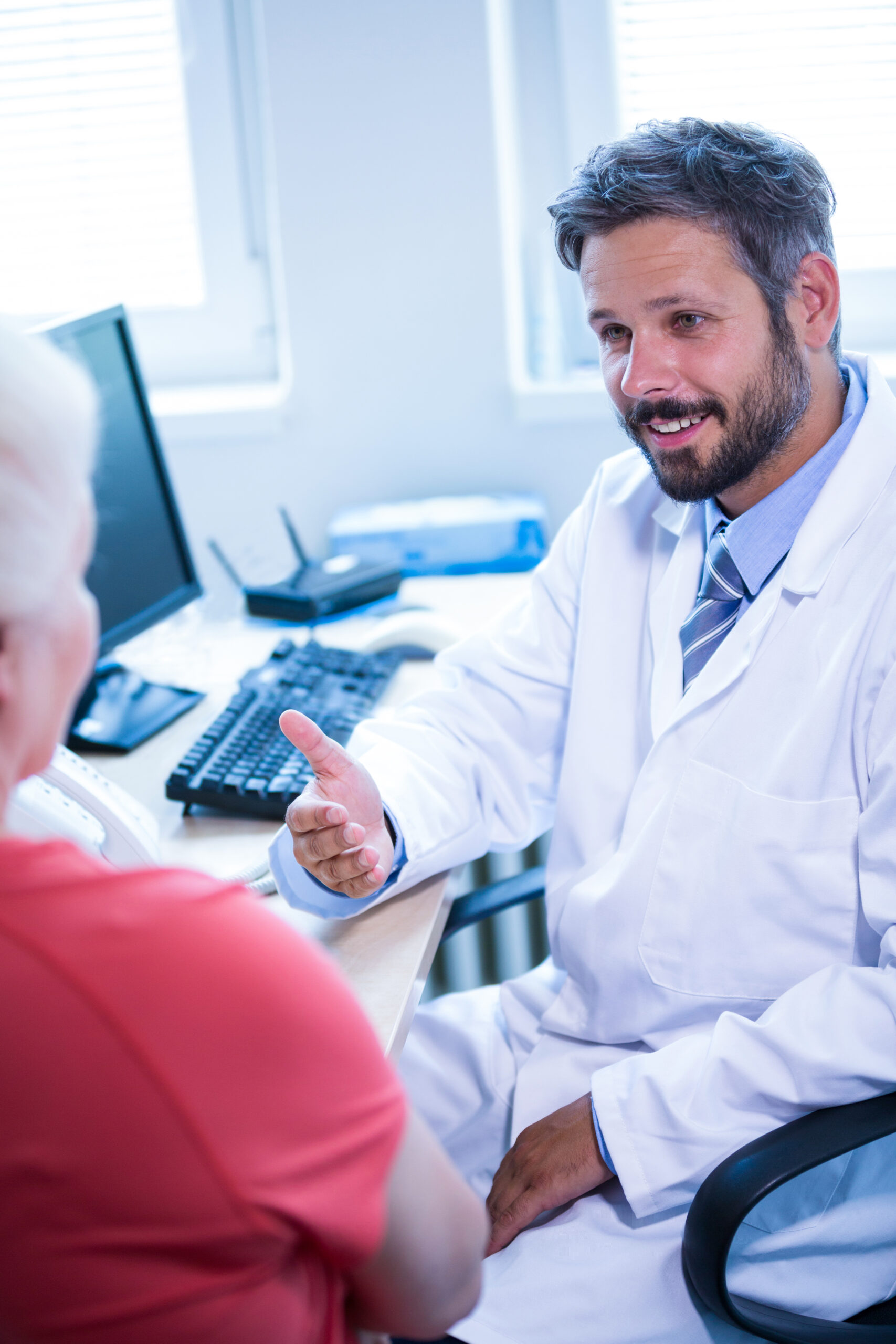What is an enteroscopy?
An enteroscopy is an endoscopic procedure where an extended, narrow, bendable tube, or scope, is inserted into the patient’s mouth and advanced as far as the second portion of the small intestine, known as the jejunum. Our scope has a light and a camera at the end, which allows our GI specialist to see the lining of the esophagus, stomach, and small bowel. An enteroscopy might be performed to identify the reason for gastrointestinal issues such as abdominal pain, bleeding, or concerning x-ray results. If you or your regular physician believe an enteroscopy is needed for your condition, you can contact our team of board-certified gastroenterologists at Hattiesburg GI Associates, PLLC for more information. Our providers often perform enteroscopy procedures for Hattiesburg, MS patients and can help you manage your GI health.

Why would someone need an enteroscopy?
An enteroscopy is most commonly conducted to diagnose abnormalities or disorders in the small bowel. Signs or symptoms of conditions that may require an enteroscopy might include:
- Unexplained diarrhea
- Abnormal growths or tumors in the small bowel
- Unexplained bleeding
- Abnormal x-ray results
To some degree, your options for alternative procedures will depend on why the enteroscopy is needed in the first place. In most patients, enteroscopy is the best way to diagnose and treat abnormalities in the upper GI tract, particularly if they involve the second portion of the small intestine. There is another imaging procedure called an upper GI/small bowel follow-through that can evaluate your upper digestive tract, as well. However, that is only a diagnostic tool, and an enteroscopy and/or surgery may still be required if an abnormality is found.
What can I expect the day before my enteroscopy procedure?
You will get instructions from your Hattiesburg GI Associates, PLLC GI provider about the required prep before your exam. You will likely be cleared to eat as you normally would the day before your procedure. You will be instructed not to consume anything by mouth after midnight except for any medications you need to take. It is very important to adhere to the guidelines provided by our team. There will also be additional instructions regarding your medications. In most cases, your medications can be taken as usual. However, in some cases, particularly in patients on anti-coagulants and diabetics, special guidelines will be given.
What will happen on the day of my enteroscopy?
Our staff will ask you to arrive at the endoscopy unit 1 – 1.5 hours prior to your enteroscopy exam. This gives you time to fill out paperwork and prepare. You will be asked to switch into a hospital gown. An intravenous (IV) catheter will be started in your arm so that you can be sedated for the procedure. You will be connected to a system that will let us monitor your heart rate, blood pressure, pulse, electrocardiogram, breathing, and oxygen level during and after the exam.
Once settled in your exam room, you will be asked to lie on your left side on the procedure bed. The sedation will then begin. Small amounts will be administered at a time to ensure your safety and that you are given only the specific amount you need. After an adequate amount of sedation is reached, the endoscope will be gradually introduced into the mouth. We will carefully advance the scope through the esophagus, stomach, and small intestine. A bit of air will be injected through the scope into the GI tract to help our team see. Any remaining fluid in your upper GI tract is removed through a suction device attached to the scope. Based on the outcome of your exam, several next steps may be suggested at the time of your enteroscopy, such as biopsies, removal of polyps, and treatment to manage bleeding. At the end of the procedure, the air and remaining fluid in your GI tract will be removed via the scope. Based on what we find, the exam takes between 15 – 45 minutes.
After the exam is complete, you will be transferred to a separate recovery room to be supervised while you come out of sedation. The amount of sedation given during your exam and your individual response to it will determine how fast you recover your faculties, though most of our patients are awake enough to be released after about 45 – 60 minutes. You will not be allowed to drive for the rest of the day, so you will need to have arrangements made for someone to take you home. We’ll advise you not to work, sign official papers, or take part in any strenuous activities for the remainder of the day. Most patients are able to eat and drink as they normally would after their discharge from the endoscopy facility, but guidelines regarding activities, eating, and medications will be discussed before discharge.
After your enteroscopy, your Hattiesburg GI Associates, PLLC team will review the results of the procedure with you. Most patients have difficulty remembering the results of the exam due to the effects of the medication. It is recommended, if you’re able, to have someone come with you with whom the results can also be discussed. You will also go home with a report. You will be informed of any biopsy results usually within seven days.
Are there risks involved with an enteroscopy?
In general, an enteroscopy is a very safe exam. Overall, complications happen in less than 1 percent of patients. Most complications are not terminal. However, if a problem does arise, it may necessitate hospitalization or a surgical procedure. Ahead of your exam, we’ll review the risks with you to make sure you understand them before signing the consent form. If any questions or concerns pop up, these can be reviewed with your GI specialist before your enteroscopy.
Complications may occur if you have an adverse reaction to the sedative. These could include (but are not limited to) difficulty breathing, effects on your heart and blood pressure, and irritation of the vein that received the medication. Bleeding could result with biopsies, removal of polyps, and dilating strictures. Additionally, significant bleeding, which could result in hospitalization or a blood transfusion, is uncommon. A hole or puncture of the esophagus, stomach, or small intestine could occur. This may be recognized at the time of the exam, or it may not be obvious until hours later. In the majority of cases, perforation will mean surgery and/or hospitalization. This is uncommon, even when biopsies are taken or dilation is performed. It is critical that you call one of our Hattiesburg, MS offices immediately if symptoms occur after your enteroscopy, like worsening abdominal pain, bleeding, or fever.
As is the case with any other procedure, enteroscopy is not without imperfections. There exists a minor, acknowledged chance that abnormal concerns, including cancers, may be overlooked during the exam. It is vital to routinely follow up with your provider as recommended and keep them informed of any new or persistent symptoms.

Trust the experts in GI health
Enteroscopy FAQs
What should I not do after my enteroscopy?
After undergoing an enteroscopy, it’s important not to eat or drink until your doctor gives you the go-ahead and to adhere to any instructions regarding medication. Additionally, you should avoid vigorous physical activities and contact our office if you encounter severe abdominal pain, ongoing bleeding, or a fever.
Who should not have an enteroscopy?
Enteroscopy might not be advisable for individuals with specific health conditions or factors that elevate the risk of complications. People with severe heart or lung diseases, uncontrolled bleeding disorders, or those who have recently suffered a heart attack may not be ideal candidates for enteroscopy due to the associated risks with sedation and the procedure itself. Moreover, those with anatomical abnormalities or strictures in the digestive tract might also be recommended against undergoing enteroscopy. It is crucial to discuss any pre-existing health issues or concerns with your healthcare provider to assess whether enteroscopy is suitable for you.
What is the main difference between an endoscopy and an enteroscopy?
The primary distinction between an endoscopy and an enteroscopy is the part of the digestive tract they examine. Both procedures utilize a flexible tube equipped with a camera (endoscope), but an endoscopy generally focuses on the upper gastrointestinal tract, including the esophagus, stomach, and duodenum. In contrast, an enteroscopy targets the small intestine, which is deeper within the digestive system and more difficult to reach. Enteroscopy is often employed when other diagnostic tests, such as endoscopy or colonoscopy, fail to yield definitive results or when there is a suspected problem in the small intestine.
